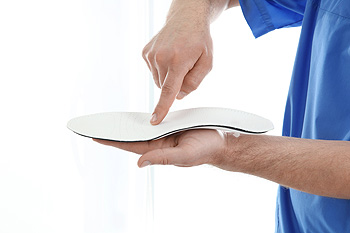Blog
Items filtered by date: September 2019
Monday, 30 September 2019 00:00
Where Do Plantar Warts Grow?
 A plantar wart typically grows into the skin on the bottom of the foot. This is a result of pressure that is endured by standing and walking for majority of the day. They are caused by the HPV virus and can appear on the heel or on the sole of the foot under the toes. This type of virus is considered to be contagious, and it is beneficial to wear appropriate shoes while in specific environments. These can include public swimming pools, shower room floors, locker rooms, and surrounding areas. Plantar warts can cause severe pain and discomfort, and it is often difficult to walk. If you are afflicted with a plantar wart, it is advised that you speak with a podiatrist.
A plantar wart typically grows into the skin on the bottom of the foot. This is a result of pressure that is endured by standing and walking for majority of the day. They are caused by the HPV virus and can appear on the heel or on the sole of the foot under the toes. This type of virus is considered to be contagious, and it is beneficial to wear appropriate shoes while in specific environments. These can include public swimming pools, shower room floors, locker rooms, and surrounding areas. Plantar warts can cause severe pain and discomfort, and it is often difficult to walk. If you are afflicted with a plantar wart, it is advised that you speak with a podiatrist.
Plantar warts can be very uncomfortable. If you need your feet checked, contact one of the podiatrists from JE Foot & Ankle Associates. Our doctors will assist you with all of your foot and ankle needs.
About Plantar Warts
Plantar warts are the result of HPV, or human papillomavirus, getting into open wounds on the feet. They are mostly found on the heels or balls of the feet.
While plantar warts are generally harmless, those experiencing excessive pain or those suffering from diabetes or a compromised immune system require immediate medical care. Plantar warts are easily diagnosed, usually through scraping off a bit of rough skin or by getting a biopsy.
Symptoms
- Lesions on the bottom of your feet, usually rough and grainy
- Hard or thick callused spots
- Wart seeds, which are small clotted blood vessels that look like little black spots
- Pain, discomfort, or tenderness of your feet when walking or standing
Treatment
- Freezing
- Electric tool removal
- Laser Treatment
- Topical Creams (prescription only)
- Over-the-counter medications
To help prevent developing plantar warts, avoid walking barefoot over abrasive surfaces that can cause cuts or wounds for HPV to get into. Avoiding direct contact with other warts, as well as not picking or rubbing existing warts, can help prevent the further spread of plantar warts. However, if you think you have developed plantar warts, speak to your podiatrist. He or she can diagnose the warts on your feet and recommend the appropriate treatment options.
If you have any questions please feel free to contact one of our offices located in Fleming Island and Palm Coast, FL . We offer the newest diagnostic and treatment technologies for all your foot and ankle needs.
Read more about All About Plantar Warts Monday, 23 September 2019 00:00
Symptoms of an Achilles Tendon Injury
 If you are experiencing pain in the calf and in the back of the heel, you may have what is known as an Achilles tendon injury. This type of injury can produce severe discomfort, and it may be difficult to walk. It is a common ailment among people who enjoy running, and may occur from a lack of stretching the muscles before running or jogging begins. Additionally, it may develop as a result of wearing shoes that do not fit correctly, or from an abrupt change in participating in sporting activities. The Achilles tendon connects the heel to the calf muscles, and if it should become inflamed, Achilles tendinopathy may occur. Some of the symptoms that are associated with this type of injury can include stiffness in the ankle and calf, and the first steps taken after arising in the morning may be uncomfortable. If you have any pain in the heel and the calf, it is strongly suggested that you speak to a podiatrist as quickly as possible who can properly diagnosis and treat an Achilles tendon injury.
If you are experiencing pain in the calf and in the back of the heel, you may have what is known as an Achilles tendon injury. This type of injury can produce severe discomfort, and it may be difficult to walk. It is a common ailment among people who enjoy running, and may occur from a lack of stretching the muscles before running or jogging begins. Additionally, it may develop as a result of wearing shoes that do not fit correctly, or from an abrupt change in participating in sporting activities. The Achilles tendon connects the heel to the calf muscles, and if it should become inflamed, Achilles tendinopathy may occur. Some of the symptoms that are associated with this type of injury can include stiffness in the ankle and calf, and the first steps taken after arising in the morning may be uncomfortable. If you have any pain in the heel and the calf, it is strongly suggested that you speak to a podiatrist as quickly as possible who can properly diagnosis and treat an Achilles tendon injury.
Achilles tendon injuries need immediate attention to avoid future complications. If you have any concerns, contact one of the podiatrists of JE Foot & Ankle Associates. Our doctors can provide the care you need to keep you pain-free and on your feet.
What Is the Achilles Tendon?
The Achilles tendon is a tendon that connects the lower leg muscles and calf to the heel of the foot. It is the strongest tendon in the human body and is essential for making movement possible. Because this tendon is such an integral part of the body, any injuries to it can create immense difficulties and should immediately be presented to a doctor.
What Are the Symptoms of an Achilles Tendon Injury?
There are various types of injuries that can affect the Achilles tendon. The two most common injuries are Achilles tendinitis and ruptures of the tendon.
Achilles Tendinitis Symptoms
- Inflammation
- Dull to severe pain
- Increased blood flow to the tendon
- Thickening of the tendon
Rupture Symptoms
- Extreme pain and swelling in the foot
- Total immobility
Treatment and Prevention
Achilles tendon injuries are diagnosed by a thorough physical evaluation, which can include an MRI. Treatment involves rest, physical therapy, and in some cases, surgery. However, various preventative measures can be taken to avoid these injuries, such as:
- Thorough stretching of the tendon before and after exercise
- Strengthening exercises like calf raises, squats, leg curls, leg extensions, leg raises, lunges, and leg presses
If you have any questions please feel free to contact one of our offices located in Fleming Island and Palm Coast, FL . We offer the newest diagnostic tools and technology to treat your foot and ankle needs.
Monday, 16 September 2019 00:00
What Are Orthotics?
 Patients who have chronic foot pain may have considered wearing orthotics. They are defined as inserts that are worn inside the shoe, and may be beneficial in controlling specific types of foot pain. Orthotics are used to redistribute the weight of the body which may be helpful in relieving pain and discomfort. Patients who choose to wear orthotics may be afflicted with rheumatoid arthritis, plantar fasciitis, and find that continually wearing these custom made inserts can provide all or partial relief. If you have a foot condition that may benefit from wearing orthotics, it is advised that you seek the counsel of a podiatrist who can properly fit you for these inserts.
Patients who have chronic foot pain may have considered wearing orthotics. They are defined as inserts that are worn inside the shoe, and may be beneficial in controlling specific types of foot pain. Orthotics are used to redistribute the weight of the body which may be helpful in relieving pain and discomfort. Patients who choose to wear orthotics may be afflicted with rheumatoid arthritis, plantar fasciitis, and find that continually wearing these custom made inserts can provide all or partial relief. If you have a foot condition that may benefit from wearing orthotics, it is advised that you seek the counsel of a podiatrist who can properly fit you for these inserts.
If you are having discomfort in your feet and would like to try orthotics, contact one of the podiatrists from JE Foot & Ankle Associates. Our doctors can provide the care you need to keep you pain-free and on your feet.
What Are Orthotics?
Orthotics are inserts you can place into your shoes to help with a variety of foot problems such as flat feet or foot pain. Orthotics provide relief and comfort for minor foot and heel pain but can’t correct serious biomechanical problems in your feet.
Over-the-Counter Inserts
Orthotics come in a wide variety of over-the-counter inserts that are used to treat foot pain, heel pain, and minor problems. For example, arch supports can be inserted into your shoes to help correct overarched or flat feet, while gel insoles are often used because they provide comfort and relief from foot and heel pain by alleviating pressure.
Prescription Orthotics
If over-the-counter inserts don’t work for you or if you have a more severe foot concern, it is possible to have your podiatrist prescribe custom orthotics. These high-quality inserts are designed to treat problems such as abnormal motion, plantar fasciitis, and severe forms of heel pain. They can even be used to help patients suffering from diabetes by treating foot ulcers and painful calluses and are usually molded to your feet individually, which allows them to provide full support and comfort.
If you are experiencing minor to severe foot or heel pain, it’s recommended to speak with your podiatrist about the possibilities of using orthotics. A podiatrist can determine which type of orthotic is right for you and allow you to take the first steps towards being pain-free.
If you have any questions please contact one of our offices located in Fleming Island and Palm Coast, FL . We offer the newest diagnostic and treatment technologies for all your foot and ankle needs.
Blog Archives
- April 2024
- March 2024
- February 2024
- January 2024
- December 2023
- November 2023
- October 2023
- September 2023
- August 2023
- July 2023
- June 2023
- May 2023
- April 2023
- March 2023
- February 2023
- January 2023
- December 2022
- November 2022
- October 2022
- September 2022
- August 2022
- July 2022
- June 2022
- May 2022
- April 2022
- March 2022
- February 2022
- January 2022
- December 2021
- November 2021
- October 2021
- September 2021
- August 2021
- July 2021
- June 2021
- May 2021
- April 2021
- March 2021
- February 2021
- January 2021
- December 2020
- November 2020
- October 2020
- September 2020
- August 2020
- July 2020
- June 2020
- May 2020
- April 2020
- March 2020
- February 2020
- January 2020
- December 2019
- November 2019
- October 2019
- September 2019
